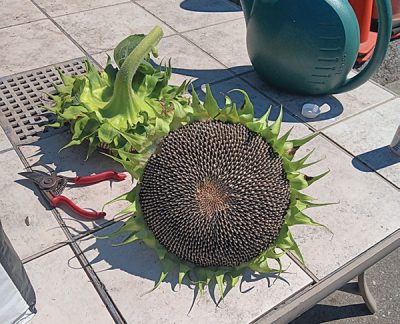Mechanic Who Harvests Seeds Says ‘I Can Put a Dent in World Hunger’
News Based on facts, either observed and verified directly by the reporter, or reported and verified from knowledgeable sources.

Vincent Masi believes he is onto something special. He just needs the horticultural world to understand what he’s doing has value.
Masi, an Armonk auto mechanic, has for the last four years taken up magnetizing seeds, and when they sprout, can grow to three, five, even seven times the size of conventionally grown plants, flowers and fruit and vegetables compared to unmagnetized seeds.
While he did not describe the process he uses, Masi claimed that if he could find a business partner in the farming industry or a university with a noted agriculture program “I can put a dent in world hunger.”
“It’s all-natural steroids,” Masi said. “It’s the greatest thing you could ever do to a plant. It’s 100 percent organic, non-chemical, and there’s no down side. I’ve been doing it for four years. I’ve done it with fruit, flowers, grasses, anything, and it always works.”
Magnetized seedlings also come up more quickly, he said. Plants that would sprout in one to two weeks often come up within 48 hours if the seeds were magnetized.
His handiwork can be found at and around the Sunoco station on Main Street in Armonk where he works. There are some of his sunflowers in small beds at the gas pump islands, and then at the property line. The plants on which the sunflowers were growing were, in some cases, seven or eight feet high.
Last week, Masi cut a couple of the sunflowers because the plant was starting to droop. He picked off the flowers and underneath he estimated somewhere between 500 and 800 seeds. He said they will be saved and harvested next year.
“I use no fertilizers, just water,” Masi said. “I mean, how do I have the largest sunflowers? I don’t see any drawbacks.”
Calls by The Examiner last week to Cornell Cooperative Extension in Westchester County were not returned. Masi said he has received virtually no responses from universities. A recent trip on personal business to Virginia, included a detour to North Carolina State, a top agricultural school, and he said they didn’t know what he was talking about.
However, in a publication on the National Institutes of Health website, it stated there is scientific data showing that using magnetic fields can enhance crop yield.
“Scientists have found that the MF (Magnetic Field) enhances seed germination by changing the biochemical processes by stimulating activity of proteins and enzymes. In fact, MF can interact with internal electric field of biological systems through its resonating behavior. Living cells possess electric charges exerted by ions or free radicals, which act as endogenous magnets and have been involved in the biochemical processes. Thus, external MF treatment increases ion uptake and therefore improves nutrition value.”
Masi said when he magnetizes seeds the plant or flower is never smaller. On a few rare occasions they are the same size to about 10 percent larger.
But there have been other times in the past four years that sunflowers as well as corn and radishes are vastly larger when they have been magnetized. Some of the highlights, Masi said, have been with seeds for the dwarf sunflower that reached 891 grams when magnetized compared to 161 grams when not magnetized. The mammoth sunflower, there was a difference of 2,000 grams (2,413 to 413).
Corn grew two to three times the size while radishes were as much as seven times larger when magnetized.
Masi has launched his own startup, Unleashing Seed Technology, in hopes of reaching farms, farmers or even casual gardeners to join him in his research.
If people send him sample seeds, he’ll even magnetize them to show that it works.
“It works with almost any kind of seed, but sunflowers I like to do,” Masi said. “People love them. I’ve done this for four years and people have always said that you have the best sunflowers.”
You can reach Masi, by calling or texting 914-314-1984.

Martin has more than 30 years experience covering local news in Westchester and Putnam counties, including a frequent focus on zoning and planning issues. He has been editor-in-chief of The Examiner since its inception in 2007. Read more from Martin’s editor-author bio here. Read Martin’s archived work here: https://www.theexaminernews.com/author/martin-wilbur2007/

